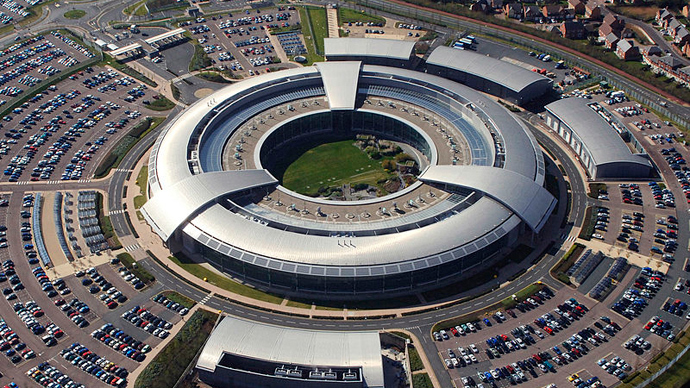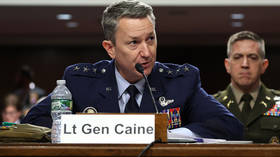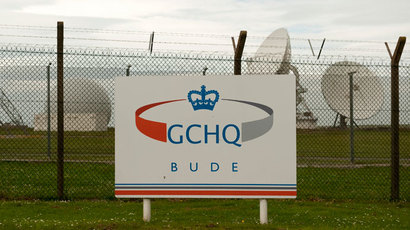British ministers answer for GCHQ mass surveillance in European court

The court in Strasbourg has ordered British ministers to provide submissions on mass surveillance programs by the UK’s spy agency to find out whether GCHQ's secret activities went against the European convention on human rights.
Four European civil rights groups filed a case against Government Communications Headquarters (GCHQ) at the European Court of Human Rights over its surveillance methods in September, after being denied the chance to challenge its practices in an open court in the UK.
The UK's Big Brother Watch, English PEN and Open Rights Group, as well as the German internet activism group, Constanze Kurz, accused GCHQ of violating the European Convention of Human Rights, insisting that alleged hacking of vast amounts of online data, emails and social media breached Article 8 of the Convention, which guarantees European citizens the right to a private family life. Their case refers to two surveillance programs by the domestic spying agency, Prism and Tempora. The campaigners, who teamed up under the umbrella title of Privacy Not Prism, claimed that GCHQ has "illegally intruded on the privacy of millions of British and European citizens.”
In line with the data revealed by former US National Security Agency, Edward Snowden, about the mass surveillance programs operated by the US and Britain, the group said that "GCHQ has the capacity to collect more than 21 petabytes of data a day – equivalent to sending all the information in all the books in the British Library 192 times every 24 hours." Meanwhile, under UK law, intelligence agencies are supposed to seek permission from the Secretary of State to read an individual's text messages.
The European Court of Human Rights (ECHR) has ordered the British government to provide their submissions by May, and the campaigners expect the court to make a ruling before the end of the year.
According to the lawyer for the groups, the ECHR has acted "remarkably quickly" communicating the case to the British government.
"It has also acted decisively by requiring the government to explain how the UK's surveillance practices and oversight mechanisms comply with the right to privacy. This gives hope the ECHR will require reform if the government continues to insist that nothing is wrong," Daniel Carey told the Guardian.
Both GCHQ and British ministers have insisted that none of their intelligence programs violated privacy laws and human rights.
According to GCHQ, all of its work is "carried out in accordance with a strict legal and policy framework which ensures that our activities are authorized, necessary and proportionate, and that there is rigorous oversight, including from the secretary of state, the interception and intelligence Services commissioners and the parliamentary intelligence and security committee."
Foreign Secretary William Hague has continuously dismissed allegations that GCHQ breached the law, saying law-biding citizens have no reason whatsover to be alarmed.
"If we could tell the whole world and the whole country how we do this business, I think people would be enormously reassured by it and they would see that the law-abiding citizen has nothing to worry about," he said in June.
"If we did that, it would defeat the objective - this is secret work, it is secret intelligence, it is secret for a reason, and a reason that is to do with protecting all the people of this country," Mr Hague explained.
Last week a joint investigation conducted by the UK's Guardian newspaper and Channel 4 News, and based on the new documents leaked by Snowden, revealed that the NSA created a secret system called Dishfire to collect hundreds of millions of text messages a day. The documents showed that GCHQ had used the NSA database to search the metadata of "untargeted and unwarranted" communications of people in the UK. According to the Guardian report, "The NSA has made extensive use of its vast text message database to extract information on people's travel plans, contact books, financial transactions and more - including of individuals under no suspicion of illegal activity."
In December, the human rights organization, Amnesty International, promised to take legal action against British security services. Amnesty claims its calls have been intercepted by UK intelligence agencies. "As a global organization working on many sensitive issues that would be of particular interest to security services in the US and UK, we are deeply troubled by the prospect that the communications of our staff may have been intercepted," Amnesty’s director of law and policy, Michael Bochenek, told the Guardian.
The group has issued a claim at the Investigatory Powers Tribunal (IPT), saying that the alleged actions by UK intelligence would be in breach of Article 8 (right to privacy) and Article 10 (right to freedom of expression) of the Human Rights Act, and demanded that the IPT hold public hearings of the process, contrary to the body’s usual practice of reviewing the complaints secretively and in an unregulated manner.















